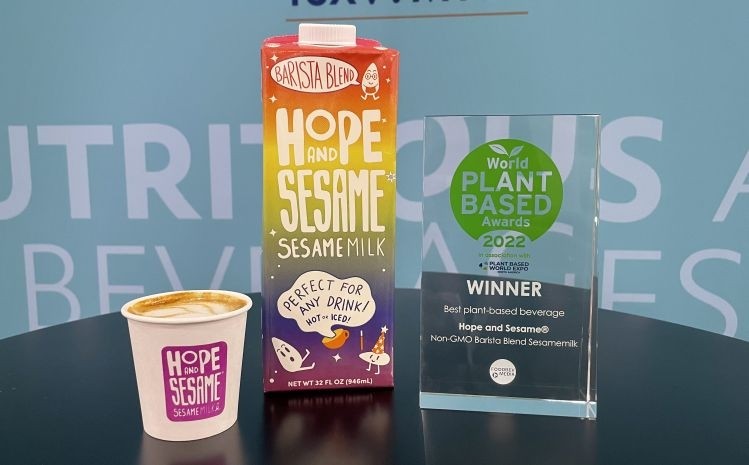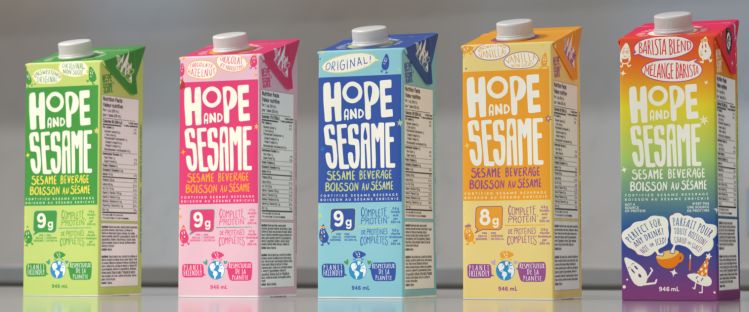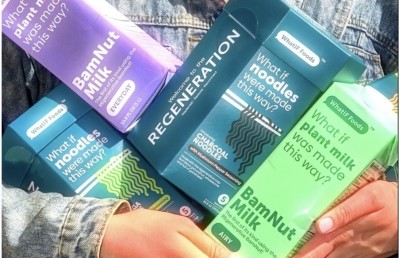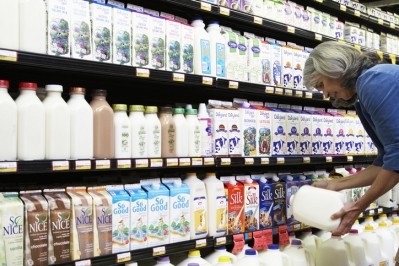Sesame milk gains traction in evolving plant-based milk market

The company – which fortifies its sesame milk with calcium and vitamin D and adds some pea protein concentrate to get to 8g protein per serving – is starting to see some real traction, four years after launch, said CEO Julia Stamberger.
“Success has been evident in both broad acceptance of sesame milk by distributors and retailers, and good initial unaided velocity at retail, as well as adoption by leading-edge independent coffee shops. This year we have added distribution in major retailers in both the US and Canada, from Sprouts to Kroger to Loblaws.”
Hope and Sesame sesame milks have been joined by barista blend sesame milk, launched in the second quarter of 2022. This line, says Stamberger, took an additional two years to formulate and perfect, and was created in tandem with a panel of master baristas: “Our goal, which we achieved, was to match the performance of dairy and oat milk in hot and iced beverage applications, including frothing, steaming, foaming, and enabling great latte art.”
Hope and Sesame Barista Blend has already won a number of industry and consumer awards for performance and taste, from the 2022 World Plant-Based Awards (Best Plant-Based Beverage), CoffeeFest (Best Product), to the Good Housekeeping’s 2022 Best Coffee Awards (Best Novel Coffee Creamer Award).
Nutrition and sensory credentials
Currently, Stamberger observes, some of the biggest subsegments in plant milk have issues around nutrition and sustainability that Planting Hope specifically worked to solve with sesame milk.
She explains, “Trading off from dairy milks, which are highly nutritious, almond and most nut milks do not contain much nutrition – typical commercial almond milks contain 1g or less of protein (vs 8g+ for dairy milk).” And, while oat milks have more protein (3 g) than nut milks, it is still an incomplete protein with fewer than the nine essential amino acids found in animal proteins, she claimed.
Also, while the most popular choice is unsweetened, oat milks with an oat base produced
enzymatically contain simple sugars that are created as the enzymes break down the oat starch, and therefore must be labeled as ‘added sugar’ on the ingredients deck, Stamberger noted. “Given those naturally occurring sugars and the resulting high GI-index maltose, oat milks can’t really play in the unsweetened segment.”
Coffee compatibility is, of course, extremely important for consumers who do not drink black coffee, and almond milk doesn’t meet performance expectations for frothing/foaming/steaming like dairy milk; while soymilks tend to overwhelm the taste of the coffee, she added.
“Hope and Sesame has a creamy mouthfeel and a ‘nutty’ note that is very complimentary to coffee and performs well in cooking/baking/overnight oats/smoothies, you name it.”
Another advantage for sesame milk is its supply chain, she added, noting that almond production has been challenged by drought while oat supplies have been volatile in recent years, again due to weather events.
In contrast, she claimed, “Sesame milk is well positioned from a supply standpoint as it is grown widely across the globe, and grows relatively quickly with low water needs and agricultural inputs, so we feel confident we can meet the growth demands of both our emerging segment and the category overall.”
Sesame’s sustainability credentials
Sesame is also a highly sustainable crop that thrives in arid/hot and dry environments around the world, with very little water required, said Stamberger, who claims the production of sesame milk uses 95% less water than almond milk and 75% less than oat milk.
Upcycled certification
Sesame (Sesamum indicum) is also self-pollinating, so doesn’t require bees (unlike almonds) or pesticides, as its hull contains a bitter acid that pests avoid. And sesame is also a versatile cover crop, often rotated with heavy feeding cash crops like cotton, making it very functional agriculturally.
“The base of Hope and Sesame sesame milk is the ultra-nutritious pulp remaining after the seeds are crushed for sesame oil, which historically has primarily been used for animal feed. As a result of upcycling this ingredient, Hope and Sesame sesame milk has just this month become the only plant milk to have Upcycled Food Association certification,” Stamberger added.
Pivot from organic
Planting Hope initially launched with an organic formulation across the line, but decided to focus on Non GMO during COVID-19 for supply chain and pricing reasons. It also refreshed its packaging and branding in what Stamberger characterizes as “a radical and successful departure from our prior trade dress and on-package messaging that is clearly resonating with our core consumer target groups.”
Since that change, the company’s distribution has scaled rapidly to include major retail partners including Sprouts, Kroger, Ahold, Loblaws and others, as well as key foodservice distribution partners like DOT Foods and Baldor, and distributors specific to the independent café space, such as Odeko and Dean’s Dairy.
In addition, in November, Hope and Sesame sesame milk was added to Amazon.ca and leading natural grocery stores throughout Canada. “The Canadian population is roughly 10% of the size of the US, but the Canadian plant-based milk market is 20% of the size of the US market, demonstrating a relatively broader embrace of plant-based products across Canadian consumers,” noted Stamberger.
Planting Hope Company has spent much of 2022 establishing its distribution network, retail presence and foodservice users, and with the application of marketing, messaging and continued efforts to educate alt-milk users to the benefits of sesame milk, Stamberger says she expects velocity to ramp up as the story of sesame milk gets to a wider audience.
“We received a lot of coverage from mainstream press in the past six months, from The Washington Post to Forbes to Good Morning America to Fox & Friends/Fox News calling out sesamemilk as the ‘next new trend in plant milks.’ In 2023, we foresee going from ‘trend’ to the ‘next new ‘it’ plant milk!” said Stamberger, who says 2023 is poised to be sesame milk’s ‘breakout’ year.
Effective January 1, 2023, foods containing sesame will be subject to mandatory allergen labeling requirements in the US.
Plant-based milk ($2.73bn category) by numbers: Oat milk and shelf-stable coconut milk driving volume
- 12 weeks to October 30: $sales +10.5%, unit sales -3%
- 52 weeks to October 30: $sales +7.6%, unit sales -1.4%
Over the latest 12-week period, all of the volume growth came from refrigerated oat milk ($+25.2%, units +7.5%), shelf-stable oat milk ($+35.5%, units +24.1%), and shelf-stable coconut milk ($ sales +91.1%, units +86.3%).
Dollar sales of almond milk – the largest segment of the category – were up +5.5% (refrigerated), and 6.9% (shelf-stable); while units were down -7.5% (refrigerated) and -6.6% (shelf stable) in the latest 12 weeks, taking the overall plant-based milk category into negative territory for unit sales.
Dollar sales of soymilk – once the category leader – were down -0.7% (refrigerated), and up +12.7% (shelf-stable); while units were down -9.5% (refrigerated) and -8.8% (shelf stable) in the latest 12 weeks.
Source: The US retail figures above combine SPINS multi-outlet (MULO) channel data powered by IRI covering food, drug and mass stores; and SPINS natural enhanced channel data, which includes co-ops, associations, independents, and large regional chains, but excludes some key players such as Whole Foods & Trader Joe’s. They do not cover convenience stores or foodservice sales, which are becoming increasingly important for plant-based milk.
















